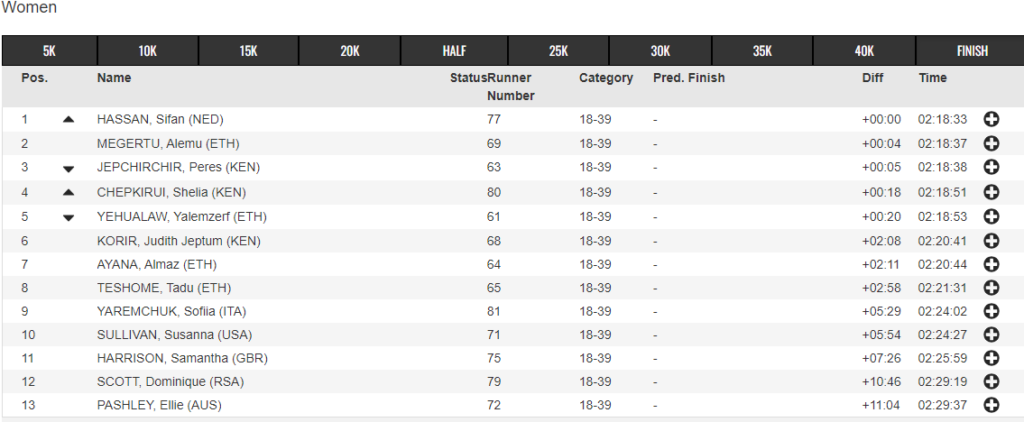LEGENDARY: Sifan Hassan Gets Dropped Early, Storms Back To Win 2023 London Marathon
By Jonathan GaultLONDON – If you were to publish a guide on how to run your first marathon based on Sifan Hassan’s experience at the 2023 TCS London Marathon, it would include the following steps:
- Don’t focus your training entirely on the marathon. You’ve still got a track season to run this summer.
- Do your final month of training during Ramadan. That means, with very limited exceptions, no food or drink during daylight hours despite grueling morning workouts.
- Develop a quad injury 10 days before the race, but forget to tape it up on the morning of the race.
- Stop twice during mile 12 to stretch out said quad. Spot the leaders 28 seconds at 25k.
- Rejoin the leaders and almost miss the 40k drinks station. Take a hard 90-degree turn and grab your bottle, narrowly avoiding being run over by the lead motorcycle in the process.
- Finally take the lead in the final 200 meters and sprint away to win like you’re running a track race.
The Sifan Hassan Marathon Method is not replicable. It is not recommended. But on a damp Sunday in London, it led to victory over one of the greatest women’s marathon fields ever assembled. In her marathon debut, Sifan Hassan is your 2023 London Marathon champion in 2:18:33, outkicking 2022 London 3rd placer Alemu Megertu (2:18:37) and Olympic champion Peres Jepchirchir (2:18:38, ending a five-marathon win streak). It is hard to remember many marathons more thrilling.
Sifan Hassan 1:56 800m Runner and Marathon Champion
There is, quite simply, no runner in history like Sifan Hassan. She has run personal bests of 1:56 for 800 meters and 3:51 for 1500. She has won world titles at 1500 and 10,000 meters on the track, and double Olympic gold in the 5,000 and 10,000 – part of an unprecedented triple that also saw her claim bronze in the 1500. And now she is a 2:18 marathoner, defeating perhaps the finest field of women’s marathoners ever assembled.
Hassan is the most versatile female distance runner in history, and has a good argument as the greatest as well. Anyone making the case for the latter honor will use today’s race as one of their first pieces of evidence, along with her Olympic triple in Tokyo – the greatest feat in the history of women’s distance running. Hassan herself said that of all her accomplishments, only those nine days in Tokyo compare to what she did on the streets of London today.
“It’s no less for me than Olympic,” Hassan said. “I never forget [this race]. I will never forget it. Never. Never.”
Hassan Overcomes Odds
Hassan did not carry high expectations into her debut. Despite her track accomplishments, the bookies only listed her at 14/1 (6.7% implied win rate). Her goal, she said, was “just to meet the marathon, get to know each other.” Speaking about her competitors, which included a record six sub-2:18 women including Jepchirchir, reigning champion Yalemzerf Yehualaw, and world record holder Brigid Kosgei (who would drop out in the first mile with a hamstring injury), Hassan’s coach Tim Rowberry, said before the race, “she’s not ready to go with these girls, to be honest.”
Many days during her preparation, Hassan would wake up and wonder why she had signed up for a marathon. That included Sunday morning, when Hassan thought of the 26.2 miles in front of her and broke down in tears.
Why did I decide to run a marathon? Hassan thought.
“I was so scared,” Hassan said.
But she made it to the start line and was with the leaders on 2:17 pace through 11 miles.
Then, disaster.
Hassan Starts to Fall Off
Hassan had spent most of her preparation in Ethiopia running on dirt roads and trails, but 10 days before London, she did a 20k workout on asphalt and wound up aggravating her upper left leg (ironically, the same area that felled Eliud Kipchoge in Boston on Monday). Hassan had planned on getting the area taped by her physio before the race on Sunday morning, but forgot. By five kilometers, the area had begun to bother her, and by mile 12, it was so uncomfortable that Hassan had to stop, making two brief attempts to stretch it out as the leaders ran away from her.
By halfway (68:29 for the leaders, 68:40 for Hassan), she was 11 seconds back, and by 25k, the gap had stretched to 28 seconds.
Hassan appeared to be in so much pain that commentators Steve Cram and Paula Radcliffe wondered on the BBC broadcast whether she should continue running. Hassan was wondering the same thing herself. She said she thought of dropping out “so many times.”
“Until the last 2k, I thought I was going to stop somewhere,” Hassan said.
Refusing to Drop Off, She Battles Back
Yet Hassan would not quit. She is an athlete who loves a challenge, and this was one of the greatest she had faced. Gradually, over the second half, Hassan closed the gap to the leaders, and by 30k, she almost caught them, only for Jepchirchir to throw in a surge and splinter the lead pack. That, again, looked to be the end for Hassan, but suddenly her leg was starting to feel good, just as the leaders were slowing, splitting 5:19-5:22-5:33 for miles 21-23 (17:16 from 35k-40k). With three miles to go, Hassan had caught them to form a pack of five: Hassan, Megertu, Jepchirchir, Yehualaw, and Kenya’s Sheila Chepkirui.
At 40k, one more challenge. As the lead quintet ran along the River Thames, following the blue line marking the shortest path to the finish, Jepchirchir drifted out to the right to grab her final bottle. Hassan, who didn’t practice fueling during training – Ramadan, remember – noticed at the last second and took a sharp righthand turn to grab her bottle, missing the lead motorcycle by two feet in the process.
But within 20 seconds, she was back with the leaders, and they were slowing precipitously, covering mile 25 in 5:39 and mile 26 in just 5:56 – the slowest two miles of the race. The race was setting up perfectly for Hassan, the world record holder in the mile.
How much of that 1:56 800m speed would Hassan have at the end of 26.2 miles? Plenty. Though she entered the final turn, less than 200m from the finish line, in 3rd place, once Hassan shifted into sprint mode there was no touching her. It was the same scene we have seen so many times on the track, this time played out at the end of a historically competitive marathon. As she streaked down the Mall, Hassan threw her arms wide in disbelief. It was only when she crossed the finish line, Hassan said, that she thought she could actually win the race.
Hassan’s win instantly goes down as one of the iconic moments in a marathon that has produced many of them through the years. After considering all she has accomplished on the track, does this victory, over this field, make her the greatest female distance runner in history? Hassan says no (“I’m just okay. I don’t need to become greatest. I’m fine the way I am.”) Others would disagree.
Does it really matter right now? We have plenty of time to settle that debate. Instead, let’s just savor a marathon we’ll never forget from a runner who continues to redefine what is possible in her sport.
My analysis appears below the results.
Quick Take: Sifan Hassan is the most versatile women’s distance runner in history
Is it possible for a woman to run 3:51 in the 1500 and 2:18:33 in the marathon? Well, yes. We knew that before the race, actually – 1500m world record holder Genzebe Dibaba (3:50 pb) debuted in 2:18:05 in Amsterdam last fall. But while Dibaba has run fast across a number of distances, she has not won repeatedly on the big stages like Hassan. Just look at this resume.
1500m: 2019 World Championship gold (in a championship record of 3:51.95, crushing the greatest miler ever, Faith Kipyegon, by more than two seconds) plus two world and one Olympic bronze
5000m: 2021 Olympic gold
10,000m: 2019 world and 2021 Olympic gold, both times crushing world record holder Letesenbet Gidey
Marathon: 2:18:33 victory in London over a loaded field including the previously-unbeatable Olympic champ Peres Jepchirchir – despite a series of mishaps
Faith Kipyegon and Peres Jepchirchir have both been utterly dominant in their respective events. Kipyegon has only been beaten in one of the last five global 1500m championships, while Jepchirchir has only been beaten in one of her last six marathons. And both were beaten by the same person, Sifan Hassan. We have never seen an athlete quite like her.
Post-Race Interview With Hassan
More post-race interviews from London can be found on our YouTube channel.
Quick Take: Why did the leaders let Hassan back into this one?
It’s hard to believe that in a field this stacked, the leaders only covered the 5k segment from 35k to 40k in 17:16 (2:25 marathon pace), and their last two full miles were 5:39 and 5:56. The pace at halfway was fairly quick (68:29), but you would have expected someone among the star-studded lead pack to be able to close faster than that. Instead, everyone slowed down. Was it a tactical error on the leaders’ part to allow the pace to go that slow and let Hassan catch up? Or were they simply tired – which, as great as these athletes are, does happen in a marathon, particularly one run in wet conditions.
Everyone in the men’s field, save for the great Kelvin Kiptum, also slowed down in the second half.
Talk about 2023 London on our world-famous fan forum / messageboard.
- MB: Official 2023 TCS London Marathon Live Coverage Thread
- MB: Hassan is the GOAT female distance runner Is she the GOAT distance runner period?
- MB: Way too early Kelvin MF Kiptum thread
- MB: Kelvin Kiptum is Self-Coached?!?!?!?
- MB: FloTrack = Canceled Apparently technical difficulties prevented them from airing the race. Need a VPN? We like this one.
Men’s Recap: Watch Out Eliud Kipchoge: Kelvin Kiptum Runs 59:45 2nd Half, Wins London in 2:01:25 On a day when the conditions caused all of the other top male and female competitors to slow down and run positive splits, Kelvin Kiptum recorded the fastest half-marathon split in history during his second half and won by nearly three minutes.



